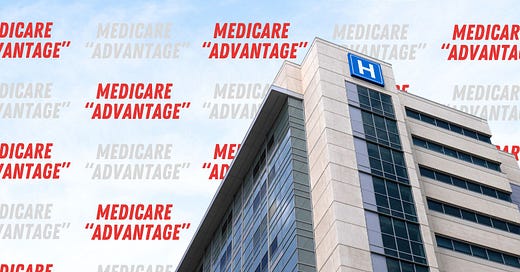

Discover more from HEALTH CARE un-covered
Private Medicare blitz: for-profit health insurers are pressing hard for new enrollees in their taxpayer-supported Medicare businesses in 2024
In western Montana, an 81-year-old woman with diabetes is fighting with Humana, the seller of her Medicare Advantage plan and an aggressive marketer of Medicare insurance options.
Humana, which holds the No. 2 spot for MA plan sales, is requiring the woman to pay the initial cost of $400 and then 90%, or $360, of the costs after that for a continuous blood glucose monitor her doctor says actually costs about $60 to $70 every two weeks.
“Humana won’t pay for it,” her physician, Dr. Gabe Charbonneau, said. “Without a lot of help, she will stop taking her meds.”
She can’t afford the device her doctor recommends on her own. Her diabetes is not well controlled, and continuous monitoring would help her stay on her medications, preventing severe complications. Instead, Charbonneau said, her Humana MA plan wants her to use finger sticks to signal when she needs more insulin.
The Montana patient, who has tried four different MA plans over the years, is one of 30 million Medicare beneficiaries who have given up their traditional Medicare benefits to join those plans, which are approved by Medicare but operated by private insurers. They’re enticed by offers of gym memberships, help to pay for vision and hearing care, and a newer entry in the grab bag of sales enticements — a card that allows beneficiaries to buy certain items with a grocery card issued by insurers.
But Medicare beneficiaries are taking a gamble when they sign up. When they take a grocery card and the other goodies that encourage them to ditch their traditional benefits for Advantage plans, they are betting they won’t get sick and need expensive care, and they hope that if they do, their claims will make it through the insurance company’s checkpoints designed to limit payment.
Those health plan consumers need to read recent revelations from STAT, which recently reported on the method UnitedHealth group is using to deny rehabilitation care for older and sicker Americans. Such stories of care denials are common in MA land, as evidenced by the statistics reported last year by the government’s watchdog, the Office of the Inspector General. The IG’s office found that tens of millions of denials are issued each year for both authorizations and reimbursements, resulting in “widespread and persistent problems related to inappropriate denials of services and payment.”
Those warnings, though, are hardly the stuff of the solicitations aimed at seniors. One outfit called MedicareInsurance.com informed beneficiaries they might be eligible for “Grocery & Utility Benefits” as well as “Rental Assistance” along with the usual lures of dental, vision, hearing, transportation and drug coverage. During the Medicare open enrollment period from Oct. 15 to Dec. 7, sellers have been bombarding the airwaves with sales pitches urging viewers to quickly sign up by calling the number on the screen. Those phone numbers channel seniors to Advantage plans. The aim is to convince as many new recruits as possible to give up their traditional Medicare benefits and supplemental Medigap policies, a combination that provides nearly complete coverage when you get sick.
If you are lucky and have no medical expenses during a year, savings may be real. But factor in the out-of-pocket deductibles, which can be thousands of dollars in MA plans, and savings in groceries and dental care might quickly be devoured by a serious illness. How many shoppers are paying attention to the significant upfront deductibles disclosed in the Medicare & You Handbook? The amounts vary by region, but in my New York county Aetna’s out-of-pocket limit for an HMO plan is $8,500; for a PPO it is $8,500 if beneficiaries stay in the insurer’s network and $12,500 if they go out. In other parts of the country, out-of-pocket amounts are somewhat less but still substantial for people on fixed incomes.
Two years ago a St. Louis woman kept track of how she and her husband had used their Medicare Advantage plan over the year and shared the information with the Center for Health Journalism at the University of Southern California. She said the $95 quarterly allowance for health-related and personal items from the Essence HealthCare company catalog was not very useful — there are only so many vitamins and bandages you need, she told me. The couple quickly learned dental benefits weren’t very useful either. The dental network was skimpy, and there was a $1,200 annual spending maximum that covered only half of the cost of the oral surgery her husband needed. The dental and vision benefits. she said, were “tokens.”
This year, curious about the incessant TV ads for Advantage plans, I did some shopping of my own. Those breathless ads convey a sense of urgency, advising viewers to call right away to connect with a licensed agent whose number is repeated several times. The ads are slick, repetitive and persuasive. “Attention everyone on Medicare,” blares one. There’s a pitch that “the Medicare hotline is accepting calls,” and that old Medicare Advantage huckster Joe Namath is still around reminding seniors to call for a “free benefits review.” He says he calls for one every year.
My little unscientific survey over about a two-hour period turned up eight different phone numbers. Three of those led me to the insurance brokerage firm TZ Insurance Solutions located in Fort Lee, New Jersey. I was suspicious. On the Better Business Bureau website were several complaints from disgruntled consumers.
I called Melissa Companick, president of the New Jersey Better Business Bureau, who told me TZ Insurance Solutions is currently rated D- on a scale of A+ through F because the company had failed to respond to nine complaints. “Because of the unanswered complaints and low rating, TZ Insurance Solutions does not qualify for BBB accreditation,” she said, adding that the firm was displaying the BBB’s Accredited Business Seal on their website without permission, “which we will address with them promptly.”
A few years ago a woman who worked for an ophthalmologist told me she was going to get an Advantage plan. Why? I asked. She said traditional Medicare didn’t provide what she needed. What was that? Eyeglasses and dental care, she replied. What about coverage for serious illness? She was healthy, she said. “Medicare doesn’t give me what I need now.” The risk of serious illness was not a concern.
In this season of open enrollment, it’s wise to heed that old consumer adage, ‘Let the buyer beware.’ As you age, do you really want to trade off the real possibility of accumulating medical debt that can scar you for the rest of your life in favor of some vitamins and a bag of groceries?
Trudy Lieberman, a past president of the Association of Health Care Journalists, has had a long career in journalism, specializing in health care in recent years. She has written for many publications including Consumer Reports, Columbia Journalism Review, The Nation, Harper's Magazine, and the Center for Health Journalism. She has won many awards for her work including two National Magazine Awards, several National Press Club Awards, and a James Beard Award.
Subscribe to HEALTH CARE un-covered
Pulling back the curtains on how Big Health is hurting Americans and how we got to this point.

















Trudy, great work as always. I had been hoping to get some medical students to count up the number of TV MA ads on a sample day, but we thought of the project too late to pull it off this year. Is there any data you know of the dollar spend on this dangerous nonsense? Ken Frisof, Cleveland, OH